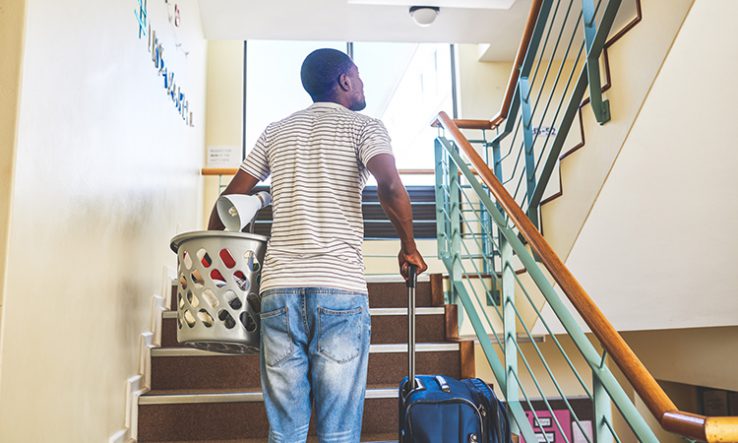
Scientific advisory group also warns over effectiveness of lateral flow tests
Students’ return to universities could be among “the last restrictions to be removed” given the high risks of Covid-19 transmission, the government’s Scientific Advisory Group for Emergencies has said.
In a 13 January report, published online on 22 February, on the risk of transmission in the spring term, Sage said students’ return to campuses “can significantly affect community transmission” and said student populations are more likely to be asymptomatic, meaning “cases and outbreaks are likely to be harder to detect among student population”.
Many universities saw outbreaks of the disease among their students when they travelled to campuses in the autumn term last year, leading to students self-isolating in their rooms in university accommodation.
Sage said that “university returns could feasibly be one of the last restrictions to be removed” given that “student returns are likely to make a big difference to transmission and, relative to other restrictions, non-returns are likely to create fewer harms if alternative modes of education, training and accreditation are found”.
However, Sage also pointed out that unless mitigations are established, disruption to university teaching “interrupts the supply chain of newly trained graduates into key worker professions” such as nursing and teaching.
‘Low risk’ from teaching
In a separate report, the group said studies from 10 universities showed “minimal evidence of transmission happening in face-to-face learning environments, such as lecture theatres”, and where Covid-19 cases could be traced back to classrooms this was usually because of “appropriate guidance not being followed”, such as students or staff removing face masks.
Despite the evidence from Sage, prime minister Boris Johnson told MPs on 22 February that only those students taking practical courses of those that need specialist facilities and on-site assessments will be allowed to return to campuses from 8 March.
All other students must continue with online learning and the government will review the options for allowing learners back to campuses “by the end of the Easter holidays”, Johnson said as he unveiled his roadmap for lifting Covid-19 restrictions.
Those students on practical courses will be encouraged to take lateral flow tests twice per week when they return to university, with the aim of catching asymptomatic Covid-19 cases and breaking the chain of transmission to avoid large-scale outbreaks.
Testing accuracy
However, in a separate report on Covid-19 and universities, dated 13 January but released on 22 February, Sage warned that the emergence of new, more transmissible variants of Covid-19 “results in impaired effectiveness of mass asymptomatic testing”.
Lateral flow tests provide results quickly, often within 30 minutes, but have been criticised by some for lower levels of accuracy than PCR tests.
Although testing students twice upon return with no social contact between the two tests could result in “a minor decrease in attack rate” from the virus, Sage stressed that regular mass testing “has a decreased ability to control case numbers” in the presence of a new, more transmissible variant.
Research Professional News understands the Department for Education’s research has not detected a decrease in the effectiveness of lateral flow tests despite the emergence of more transmissible variants.
In its report on the spring term risks, Sage said more work was needed “to understand the costs, feasibility and acceptability of universal, asymptomatic testing of staff and students in universities”.
“Existing research must be extended to broader, more diverse student and staff populations, and focus on student perceptions, experience, and responses,” Sage wrote, adding that a support package covering those concerns should be made available “as a matter of urgency”.
Mental health and wellbeing
The Sage paper also noted that “the mental health impacts of Covid-19 on university students is evident”.
“University counselling and support services struggled to meet rising demand prior to Covid-19. Universities will need support in addressing the impacts of Covid-19 on the mental health and wellbeing of their student population. Consideration of extending this support beyond graduation is needed.”
Universities generally welcomed the plan for students on practical courses—who require specialist equipment or facilities—to have in-person teaching again from 8 March.
“Our members have worked hard to make campuses Covid-secure, with twice-weekly testing and very low overall infection rates this year—even with students from high-priority courses already back on campus,” said Tim Bradshaw, chief executive of the Russell Group of research-intensive universities.
“Whilst we understand the importance of easing lockdown in a cautious and controlled way to ensure further tightening of measures are not required, we would urge the government to consider whether more students can return to in-person teaching at the roadmap’s first review point in early April.
“An earlier return will be particularly beneficial for the mental health and wellbeing of students. In the meantime, we will continue to offer students the best possible online teaching and support.”
University Alliance chief executive Vanessa Wilson said that for those students unable to return, “Alliance universities will continue to draw on their extensive experience of a digital-first teaching approach to continue to offer extensive online academic and pastoral support”.
But she, like Sage, highlighted a need for further support to universities.
“Alliance universities have made significant investments to ensure support reaches those students most in need, including those facing financial difficulty and to tackle challenges relating to digital inclusion and wellbeing. As students and institutions continue to face growing pressures from the impact of the pandemic, further funding will be needed to enable universities to best support students to succeed.”